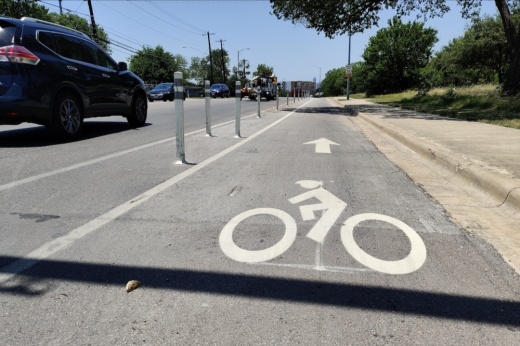An outline for a "Bike Lane Blockage Program," which would split ticket revenue from citations for obstructed bike lanes with any resident who logs an infraction through Austin 311, was unanimously supported by the Urban Transportation Commission June 7. Chair Mario Champion said the concept came together as a way to encourage clearing the way for Austin cyclists who frequently encounter cars, delivery trucks and other obstacles on their rides.
“Bike lanes are something we spend money on, and study after study shows that safe, separated infrastructure or the perception thereof—or the lack of this—is the number one reason why people ... say, ‘This is why I don’t ride my bike more,'" Champion said.
Austin has a similar, although limited, program for citizens to report vehicles that are improperly parked in accessible parking spaces, which Champion said could serve as a reference point for the new proposal. And even though Austin staff are already on the lookout for blocked bike lanes—the city has ticketed more than 1,200 vehicles and towed more than 130 for violations over the past two years—Champion said the new program would build on that enforcement given the city's limited ability to monitor all bike lanes at all times.
“This does not solve everything. It says, ‘There are already ordinances that say don’t park in bike lanes; don’t obstruct the bike lanes,’ and the city doesn't have the staff to manage that," he said.
The commission's recommendation will be forwarded along to City Council members for consideration and possible adoption in the future. The plan also asks the city to look at other rule changes and communication efforts to alert drivers about penalties for blocking bike lanes and to highlight places where parking in those lanes might be permitted.
Jason Redfern, parking enterprise manager with the Austin Transportation Department, also noted the city offers a permit program, allowing delivery vehicles to take up a lane of traffic rather than a bike lane in certain situations.
While there were no votes against the recommendation for the program's development, Commissioner Samuel Franco also said he hopes to see more information about any possible issues the initiative could cause as well as other cities that have supported similar "bounty" efforts before it is rolled out.
“Where else has it been done, and what are some of the negative effects?" Franco said. "Like anything, there’s always some sort of collateral damage, and I’d like to know what that could possibly be from implementing this. I wouldn’t want to pit Austinites against Austinites."





